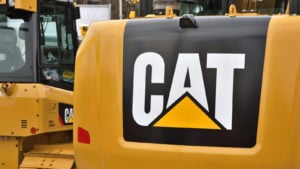Some companies offer massive one-time dividend events. Others take on hefty debt loads to juice their yield without shielding themselves financially from the future. Others don’t have what it takes to adapt to changing market conditions. For example, many of the most popular REITs are facing a reckoning amid commercial and residential real estate turbulence. For years, “gurus” pushed these stocks on investors who now see their retirement portfolio crumbling.
Luckily, these three standout dividend stocks for retirement don’t have those problems. Each offers long-term stability coupled with dividend reliability and sustainability.
Emerson Electric (EMR)

Emerson Electric (NYSE:EMR) offers an enticing prospect for income-seeking investors. With a current dividend yield of 2.3%, there are greater income-producing stocks on the market.
What truly sets Emerson Electric apart is its extraordinary track record of increasing dividends for an impressive 66 consecutive years. This remarkable streak makes it an attractive choice for investors prioritizing sustainable and growing dividend income.
Despite reporting slightly flat quarter-over-quarter earnings of $1.29 per share, EMR outperformed analyst expectations. Notably, the company exceeded revenue projections, with $4.09 billion in revenue. As a major player in global industrial automation, Emerson Electric plays a pivotal role in shaping industrial processes and technologies.
Admittedly, EMR faces short-term challenges related to supply chain disruptions. However, the company’s strong historical performance and commitment to innovation make it a compelling dividend stock for those looking to protect their portfolios against market volatility.
Walmart (WMT)

Walmart (NYSE:WMT) is a cornerstone of dividend stock portfolios, particularly during economic downturns. As the world’s largest supermarket and general merchandise retailer, Walmart boasts a vast global presence, with over 11,500 stores spanning 27 countries.
Today, 90% of the U.S. population lives within a 10-mile radius of a Walmart store. Offering unmatched convenience to consumers, Walmart is committed to low prices. This commitment makes Walmart the go-to destination during challenging economic times, helping individuals stretch their budgets.
In addition to its everyday products, Walmart has an impressive dividend history. The company initiated dividend payouts in March 1974 at a rate of 5 cents per share, and today, it offers a solid forward yield of 1.36%. Even more remarkable is the consistent 8% annual dividend growth rate that Walmart has sustained for over half a century. This financial strength and consistency across economic cycles cement its status as a resilient dividend stock for retirement.
Caterpillar (CAT)

Caterpillar (NYSE:CAT) specializes in manufacturing, construction, mining, and engineering equipment. Consequently, it’s a favored choice among long-term and income-oriented investors.
Despite a dividend yield slightly below 2%, Caterpillar boasts an impressive 31-year streak of consistently increasing dividends. CAT has earned it a respected position in the world of dividend stocks.
Caterpillar’s stock is stable (if not remarkable) this year, returning 1.17% since January. Despite relative flatness, the company surpassed earnings and revenue expectations in the third quarter. Caterpillar reported a robust 12% surge in revenues, reaching a total of $16.8 billion, with earnings per share at $5.45. As the largest global manufacturer of construction and mining equipment, Caterpillar plays a pivotal role. It represents itself as an indicator of the world’s economic well-being. Additionally, recent strong performance might mean an imminent return to normal economic activity.
Further, Caterpillar sets itself apart with its strong commitment to artificial intelligence and automation. Right now, 13% of construction professionals utilize automation tools, and 60% expect to do so in the future. Caterpillar is at the forefront of this industry trend. It offers a comprehensive range of automated construction equipment, including self-digging solar ditch machines. Its adaptability to emerging technologies and trends solidifies its status. CAT has become one of the top choices for dividend investors seeking resilience, growth potential, and retirement-focused stability.
Jeremy Flint, an MBA graduate and skilled finance writer, excels in content strategy for wealth managers and investment funds. Passionate about simplifying complex market concepts, he focuses on fixed-income investing, alternative investments, economic analysis, and the oil, gas, and utilities sectors. Jeremy’s work can also be found at www.jeremyflint.work.
